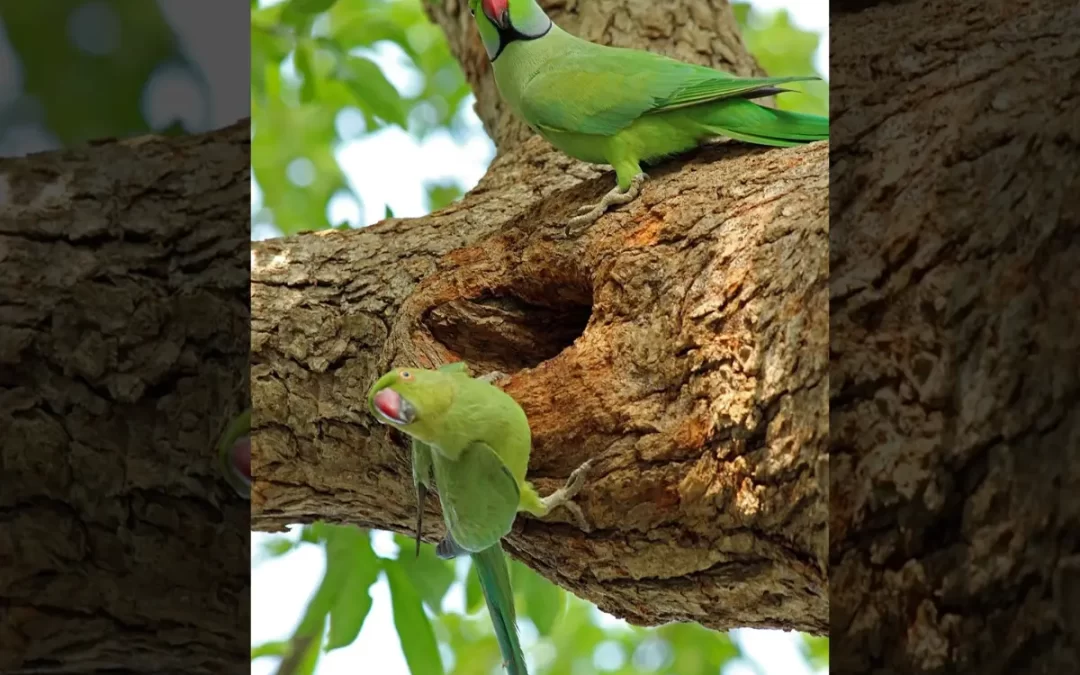Read in : தமிழ்
The sight of roadside or mobile astrologers with a caged parakeet has almost become rare nowadays, thanks to the forest department’s crackdown aimed to protect the rare species facing extinction. The parakeet is a small parrot with green plumage, red curved beak and rose ring around the neck.
The Tamil ‘kili’ with historical, social and literary connotations actually refers to a rose-ringed parakeet called ‘payantrangkili’ in Sri Lanka. While a male parakeet has a black and pink ring around the neck, a female does not have such a ring.
Credited with having the ability to repeat words uttered by humans, the parakeet is known by several Tamil words such as ‘anjugam’, ‘thathai’, ‘killai’ and so on. Unlike other birds, the parrot or parakeet does not build nests in tree hovels. Once it used to be bred in cages as pets at home.
Belonging to the family known as Psittacidae, the parrot is seen in all tropical and mild tropical countries. A parrot weighs 10 gram to four kg. While the parrots live in large numbers in Australian and South African forests, Tamil Nadu is home to rose-ringed parakeets.
Also Read: Saving vultures: Our half-baked science has killed this benevolent, skillful bird
Generally, seeds, fruits and flowers are the parrots’ staple food. The ‘kea’ species of parrots in the Australian forests eat rotten carcasses. The large parrot species known as ‘kakapo’ does not fly and it hops from tree to tree. This species is preserved for it is facing extinction.
Ornithologists credit parakeets with having an IQ equal to that of a four-year-old child. Grey parrots living in the African forests are found to be retaining up to 100 words in memory.
A parakeet can eat food using its legs, each of which has four fingers — two protruding and two slantings backward.
Parrots have associations with the Tamil Sangam Age which has literary pieces of evidence for the trend. In the long tradition of Tamil poetry, they have a prominent slot. In the religious context too, they have significance. For instance, a parrot is an inseparable part of the persona of Goddess Meenakshi.
The bright color, aesthetically curved beak and tranquil poise of a parrot are so charming that humans feel attracted to them so they breed the docile birds in cages. Caged parakeets are common among the Tamil inhabitants in Sri Lanka and were once so in Tamil Nadu.
But the Wildlife Protection Act, 1972, which has been amended seven times till now, views the caging of birds including parakeets as an offence. This, in turn, has led to the shrinking practice of caging of the birds and also to the falling trend of astrologers using caged parrots for making predictions by way of earning their livelihood.
Ornithologists credit parakeets with having an IQ equal to that of a four-year-old child
Generally, the Indian Penal Code places the onus of proving the guilt of an accused in a crime case on the law enforcers. But the Wildlife Protection Act is more stringent in that it fixes the responsibility on the accused to prove their innocence.
Also Read: Govt. rewards dugong rescue in Gulf of Mannar
Moreover, parakeets have figured on the red list prepared by the International Union for Conservation of Nature (IUCN). An awareness of protecting the biodiversity has also caught on among the people in Tamil Nadu. Several conservationist groups are, of late, showing more interest in protecting birds facing extinction. The public take part in the bird census held now and then.
All these factors have driven the Forest Department to gird up its loins and crack down on offenders who use caged parakeets for their commercial ends. Thus, thousands of parrots have been released from captivity.
The axe has also fallen on the self-styled astrologers, holding caged parrots, particularly in picnic spots such as Mammallapuram, exploiting beliefs that the birds have oracular powers.
All these measures to protect parrots are yet to rub off on the people in villages. So, a campaign must be intensified among the people from all walks of life and from all parts of the state. Caging parrots is as illegal and wrong as stoning crows, as per wildlife protection laws.
Read in : தமிழ்











